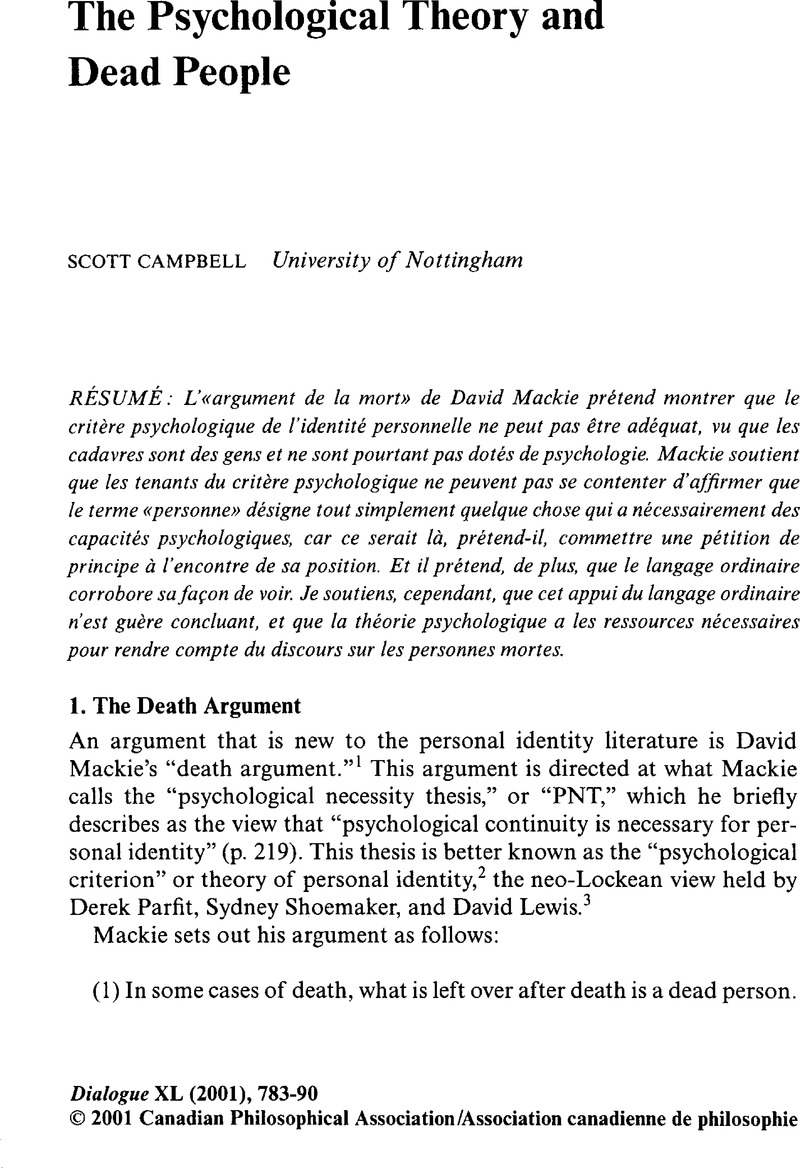Article contents
The Psychological Theory and Dead People
Published online by Cambridge University Press: 13 April 2010
Abstract

- Type
- Articles
- Information
- Dialogue: Canadian Philosophical Review / Revue canadienne de philosophie , Volume 40 , Issue 4 , Fall 2001 , pp. 783 - 790
- Copyright
- Copyright © Canadian Philosophical Association 2001
References
Notes
1 Mackie, David, “Personal Identity and Dead People,”Philosophical Studies, 95, 3 (1999): 219–42. All references to Mackie will be to this paper.CrossRefGoogle Scholar
2 If Mackie's argument worked, it would defeat not only the psychological theory, but also the weaker view that denies that psychological continuity is necessary for one to continue to exist, but holds that one cannot exist if no psychological states or capacities exist. (On the latter view, but not the former, one could survive a brain zap which disrupted continuity.) I will take it that “PNT” includes both views.
3 Parfit, Derek, Reasons and Persons, rev. ed. (Oxford: Clarendon, 1986)CrossRefGoogle Scholar; Shoemaker, Sydney and Swinburne, Richard, Personal Identity (Oxford: Blackwell, 1984)Google Scholar; and Lewis, David, “Survival and Identity,” in The Identity of Persons, edited by Rorty, A. O. (Berkeley: University of California Press, 1976), pp. 17–40.Google Scholar
4 Thomson, Judith Jarvis, “People and Their Bodies,” in Reading Parfit, edited by Dancy, J. (Oxford: Blackwell, 1997), p. 202.Google Scholar
5 My defence here is only of the psychological theory; I do not consider the other view which I said (in note 2) falls under “PNT.”
6 Scott Campbell, “The Psychological Theory and the Human-Person Relation,” forthcoming.
7 Another conception of a person that many psychological theorists would accept is that a person is a physical object, but an object distinct from the body with which it shares its matter. For various reasons, I find this view unacceptable. This view will also be hard pressed to explain why it is natural to call a dead body a “dead person.” It could say “A dead body is a person in the loose sense that it used to share its matter with a person,” but this is not as close a relationship as embodiment.
8 I would like to thank the Philosophy Programme in the School of Advanced Study at the University of London and, in particular, the Head of the Programme, Tim Crane. I worked on this paper while I was a Visiting Fellow there in 1998–99. Thanks also to Tirsha Raynlyn for support
- 1
- Cited by




